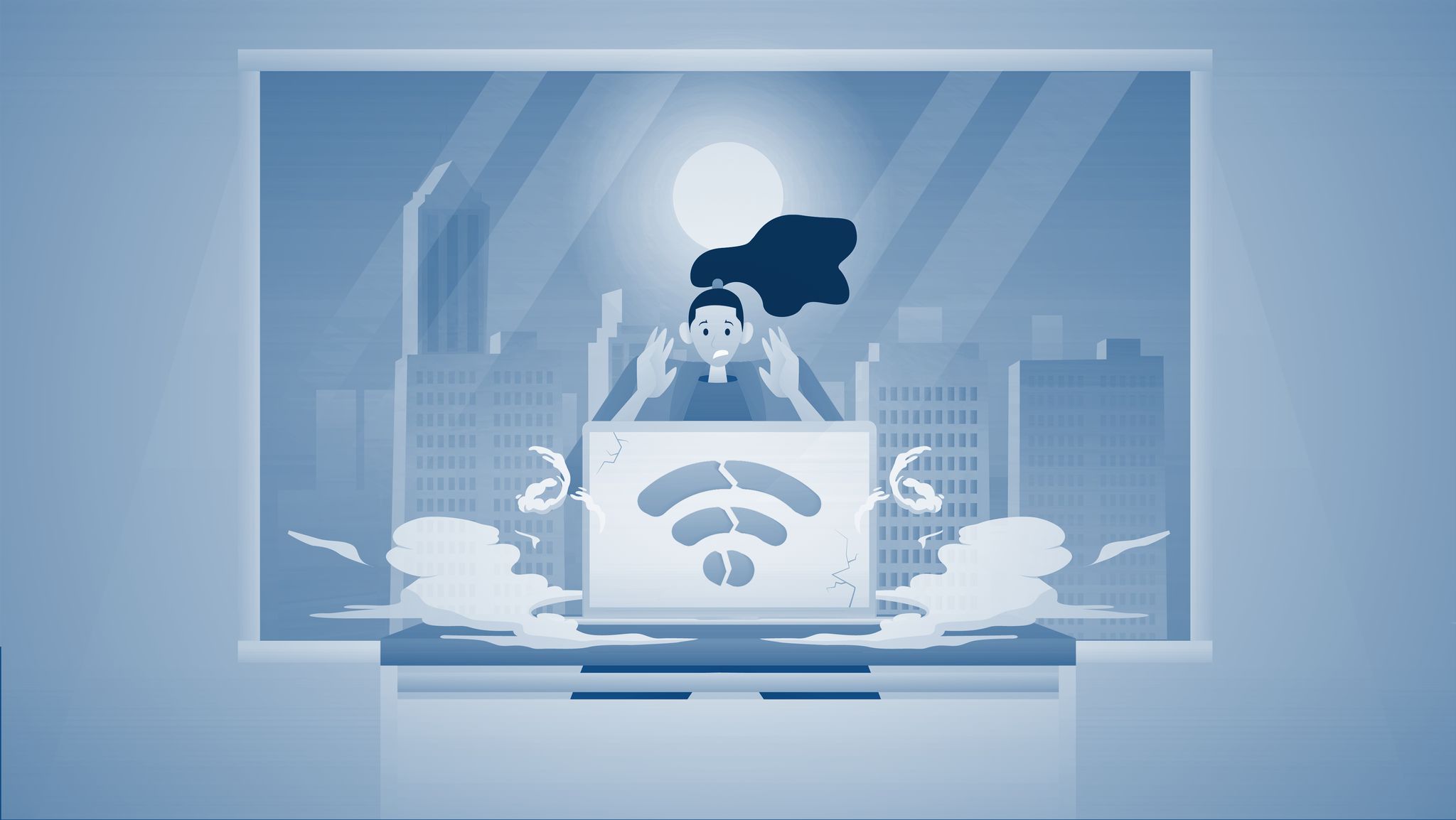In today’s fast-paced digital world, having a fast and reliable business internet connection in the Philippines is a necessity. Whether you’re looking to do some work-related projects or host a virtual meeting, having a good connection is essential for you to succeed.
However, maintaining the quality of your business internet experience can be challenging. Lots of components come into play when it comes to the quality of your connection, and each seemingly trivial issue can actually affect a decent online video meeting and make it an awkward, choppy meeting. There are many factors that can affect the quality of your internet connection. From the router’s placement to the ISP you choose, knowing the top factors that impact your internet connection’s performance can help make your business internet experience seamless. In this article, we will dive into the 7 key factors that can affect the quality of your internet connection and provide you with some expert tips on how you can optimize your Wi-Fi connection for a faster, more reliable connection!
Location
The location of your Wi-Fi router can affect the strength and quality of your Wi-Fi signal. The signal strength decreases as you move further away from the router. Walls, floors, and other obstacles can also weaken the signal. The best location for your router is in a central location on the main floor of your office. If you have a multi-story building, it’s best to place the router on the upper floor for better coverage. You should also avoid placing your router near metal objects or other electronics that can interfere with the signal to ensure your signal remains fast and reliable. Placing routers too close to each other can also muddy the signal quality so make sure you space them evenly so that they cover your desired location without interfering with each other.
The location of your Wi-Fi router and/or wireless access points can affect the strength and quality of your Wi-Fi signal. The signal strength decreases as you move further away from the wireless router and/or wireless access points. Walls, floors, and other obstacles can also weaken the signal.
To ensure optimal Wi-Fi performance, follow these tips on where to best place your wireless router:
- Central Location – In standard office setups, position the router centrally on the main floor to evenly distribute the signal, minimizing dead zones. Note that depending on your floor area and how rooms and divisions are set, you may need to add or relocate your wireless routers so that there are no important areas with poor signal quality.
- Multi-Story Offices – For businesses with multiple floors, a good rule of thumb is to place at least one access-point (APs) per floor, though you might need to add more depending on your floorspace. This is because dense materials, like ceilings and floors, can disrupt your wifi connection and the signal generated by your router is stronger horizontally. .
- Avoid Obstacles – Think of your wifi signal as thousands of tiny beams that originate from a single point (the antenna). When something blocks these beams, like a wall, it takes the signal more effort to reach your device; therefore reducing signal quality. By reducing the amount of obstacles from your device to your access point, you can keep a clear line of sight for these beams to have an uninterrupted connection. This will help maintain a consistent speed for your wifi signal.
- Space Routers Evenly – When using multiple routers, ensure proper spacing to prevent signal overlap and ensure reliable coverage.
Environmental Factors
The weather in the Philippines isn’t always stable, and bad weather can have a big impact on your internet connection. Heavy rain, winds, humidity, excessive heat or cold, and extreme weather conditions can greatly affect and slow down your business internet signal. While these types of disruptions are beyond your control, having an ISP like RISE can help the process not be a headache because of their network redundancy system that has the highest possible uptime for network connections during harsh weather-related events.
For those relying on wireless internet connections, such as 4G or WiMax, microwave radio, or satellite internet, heavy rainfall can be a major issue. The impact of rain on wireless signal strength to customer premises can lead to potential disruptions and signal degradation. Unfortunately, this is one of those situations beyond your control, and it can cause frustration and inconvenience when you most need a stable internet connection.
Even for those with a wired internet connection, such as copper or fiber, extreme weather events like typhoons pose a serious threat. The ferocity of typhoons can cause trees to fall onto cables, resulting in cable cuts. Extreme weather can also bring down utility poles, further exacerbating the problem.
However, there is a silver lining for those who are connected through RISE and its reliable network redundancy system. During harsh weather-related events, RISE ensures the highest possible uptime for network connections. This means that even in the face of adverse weather conditions, RISE can help ensure that your internet connection remains stable and reliable.
While disruptions caused by the weather are inevitable, having a reliable and resilient ISP like RISE can prevent these situations from becoming a headache.
Equipment Quality
The type of hardware you use can also affect the quality of your internet. For example, older devices may not handle the latest internet speeds. Some companies may have business internet requirements that can’t be met with the current or old equipment that they’re currently using. Aside from the equipment quality, the performance of their signal would also depend on the design choices the equipment manufacturer would make. For the best experience, using a wired connection offers superior performance and will closely mirror your contracted speed.
Access Point Location
The location of your access point can affect your business internet’s speed and quality. If your access point is too far from your device, the signal may be weak and slow. Other obstacles, such as walls, concrete pillars, and other huge metallic objects, can also interfere with the signal, making it unreliable.
Cable Medium
One of the most overlooked aspects that affect internet speed are hardware limitations, such as the types of cables used for your connection. Digital Subscriber Link (DSL) uses copper wires as well as an electric cable in order to transmit data from the internet to your business. The physical limitations of this type of connection mean that it can only go up to 100mbps in perfect conditions. It is slowly being phased out by the faster Fiber Optic Cable used for high-speed internet; typically up to 1Gbps. If you are still using DSL connections, consider switching to the quicker and more modern fiber-optic connection. RISE offers entry-level Commercial Broadband Fiber Connections up to 100 Mbps for a faster and more reliable internet experience.
Number Of Devices And Users
Multiple devices and users connected to your internet can affect the performance of your internet. If there are too many devices or users connected to your network, they may be using up too much bandwidth, which would slow down your connection. If too many devices are connected to your Wi-Fi network, it can lead to network congestion, which can affect your Wi-Fi signal strength. If you are experiencing slow Wi-Fi speeds or dropped connections, consider limiting the number of devices that are connected to your network or investing in a router that can handle more devices.
Internal Network Traffic
Managing internal network traffic is crucial for ensuring optimal internet performance beyond your provider’s demarcation point. Internal congestion between different departments can create bottlenecks, slowing down overall connectivity within your organization.
To address this, it’s essential to tailor your internal network setup to meet your operational demands. While your internet plan may provide sufficient bandwidth for external connections, it’s equally important to ensure that your LAN infrastructure can support internal data transfer efficiently.
Consider investing in a robust LAN infrastructure with adequate access points and switches to facilitate smooth device-to-device communication. By optimizing your internal network, you can enhance the overall internet experience and mitigate potential slowdowns caused by internal congestion.
Your ISP (Internet Service Provider)
The choice of your Internet Service Provider (ISP) is a crucial factor that can affect the quality and speed of your business Internet connection. Having fast internet in the Philippines is a must, and different ISPs offer varying levels of service, speed, and quality, so it is vital to research and select an ISP that meets your needs. Your internet connection speed is determined by the amount of data that can be transmitted per second. Factors like connection strength and network congestion are factors from your ISP that can affect the quality of your internet connection. ISPs can also impact signal quality by providing low-quality equipment or not maintaining their network infrastructure properly. It is essential to consider upgrading your internet plan or switching to a different ISP that offers faster internet speeds for a better online experience.
Thankfully, RISE offers every customer a premium after-service. Our Platinum Enterprise Plan ensures that you encounter no slowdowns under normal network conditions with our 100% Committed Information Rate) and if you ever encounter any problems, our network engineers are on standby to help you 24/7.
Lastly, slow internet speeds can be caused by your current internet plan, particularly with your plan’s speed, leading to a frustrating experience. It might be time to consider upgrading your current plan or switching to a different ISP that offers faster and more reliable internet speeds. As your organization grows, your initial internet plan might not be suitable for the scale of your operations. When you have employees who use cloud applications, video calls, file sharing, and other operations that use an active internet connection, upgrading your plan to a higher speed will ensure that everyone in your organization has enough bandwidth to complete their tasks seamlessly.
Thankfully, RISE offers every customer a premium after-service. Our Platinum Enterprise Plan ensures that you encounter no slowdowns under normal network conditions with our 100% Committed Information Rate) and if ever you encounter any problems, our network engineers are on standby to help you 24/7.
Key Takeaway
If you want to succeed in today’s digital age, having a reliable business internet in the Philippines is a must. The Speed and Quality of your internet are vital keys to your success. Knowing the factors that can affect your internet’s performance is great for ensuring that you get a fast and reliable connection.
Choosing the right ISP is a game-changing aspect that can help ensure that you don’t encounter any hindrances that can affect your business operations. RISE is a internet service provider for businesses all over the Philippines, offering a network redundancy system that ensures its customers the highest possible uptime for network connections; even during harsh weather-related events! You can trust RISE with a seamless online experience that’s catered to your business needs.
For more tips and tricks on how to diagnose and solve your internet issues, click here.



